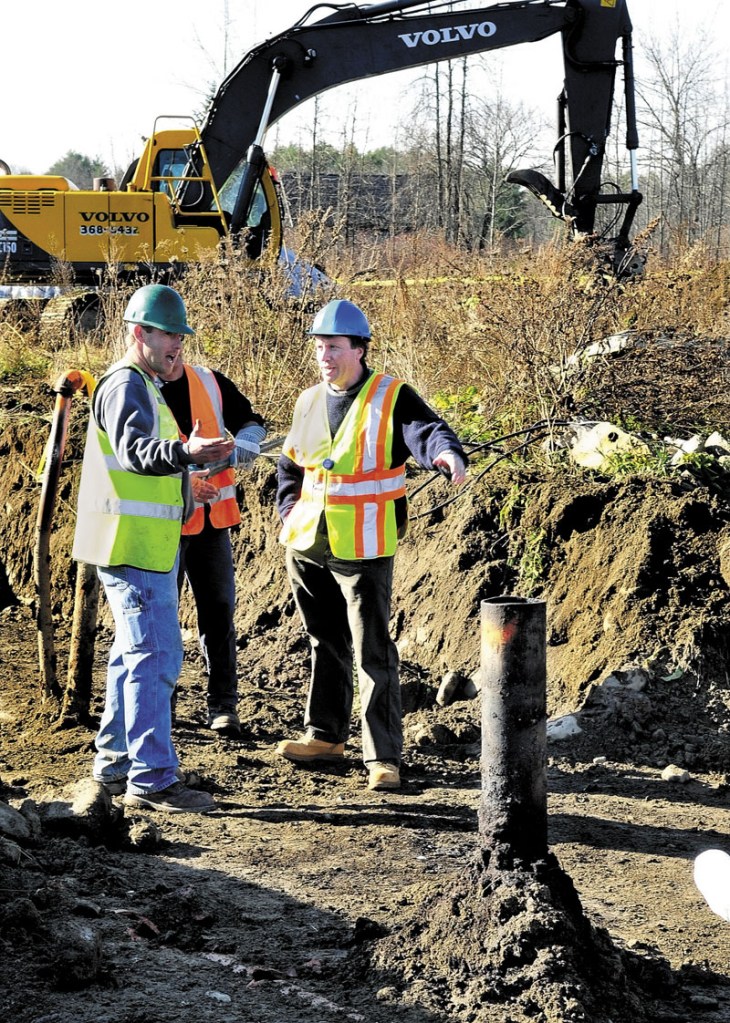BENTON — Everett Whitman sat in his white sedan parked near his former floral shop and greenhouses on Clinton Avenue and watched the hazardous waste cleanup this week.
The 76-year-old said when the heating system at J&A Floral fell into disrepair seven or eight years ago, he was unable to continue the third-generation family business.
The ongoing cleanup entails emptying and removing the buried nonconforming bare steel oil tanks once used to help heat the greenhouses, as well as carting away contaminated soil, according to Chris Swain, an environmental specialist with the Department of Environmental Protection. The project is expected to be completed by the end of November.
The U.S. Environmental Protection Agency and Maine Department of Environmental Protection, as well as CleanHarbors, which specializes in hazardous waste disposal, and R.D. Paradis & Son, an excavation company from Newport, are taking part in the Brownfield project.
A Brownfield project is a cleanup that will both protect public health and promote reuse of the land.
Swain said the Clinton Avenue project would likely cost about $115,000; the federal enviromental agency is paying up $100,000 and the state agency will incur about $15,000 in expenses.
He said the department became aware of the problematic oil tanks a few years ago, but a backlog of several hundred other sites delayed the cleanup.
Swain said Whitman, who is unable to pay for the removal of the tanks, has been cooperative in the process. The state, Swain said, is concerned with protecting natural resources rather than punishing citizens unable to pay for cleanup.
“This is a highly visible site but this is not uncommon. Nothing was done in blatant disregard,” Swain said, adding the hazardous waste resulted from doing normal business.
Swain said Whitman heated the greenhouses with waste oil; the product is still in the tanks. “It was fairly common,” Swain said. “And cost-effective. We run our economy on petroleum. And this is the cost.”
Underground oil tanks are now required to be made of fiberglass or protected steel, he said.
The state environmental agency is in charge of removing the six nonconforming bare steel oil tanks buried at the site. Swain said the tanks vary in size from 1,000-gallon capacity to 15,000-gallon capacity. Each spot where an oil tank is located is cordoned off with yellow caution tape.
Swain said removal of the tanks is a priority before any leaked hazardous waste damages nearby wells or the Sebasticook River. Benton Falls dam is almost directly across Clinton Avenue.
Over time, Swain said, if area wells were to get contaminated, the issue would be exacerbated by going from a financial issue to an emotional problem.
“We have the money to avoid that,” Swain said. “Let us come and take care of the problem. It only gets worse (if you don’t).”
Federal officials, Swain said, are in charge of removal of any contaminated soil. He said it might be burned, used as cover material in a landfill or mixed with other substances and used to build highway off-ramps.
Swain said while people should not be afraid call the Maine’s Department of Environmental Proctection.
“We’re not the environmental police. I hope anyone out there who reads this and who has (unsafe) tanks in the ground calls us,” he said. “We look to make the situation better.”
Beth Staples — 861-9252
bstaples@centralmaine.com
Send questions/comments to the editors.



Success. Please wait for the page to reload. If the page does not reload within 5 seconds, please refresh the page.
Enter your email and password to access comments.
Hi, to comment on stories you must . This profile is in addition to your subscription and website login.
Already have a commenting profile? .
Invalid username/password.
Please check your email to confirm and complete your registration.
Only subscribers are eligible to post comments. Please subscribe or login first for digital access. Here’s why.
Use the form below to reset your password. When you've submitted your account email, we will send an email with a reset code.